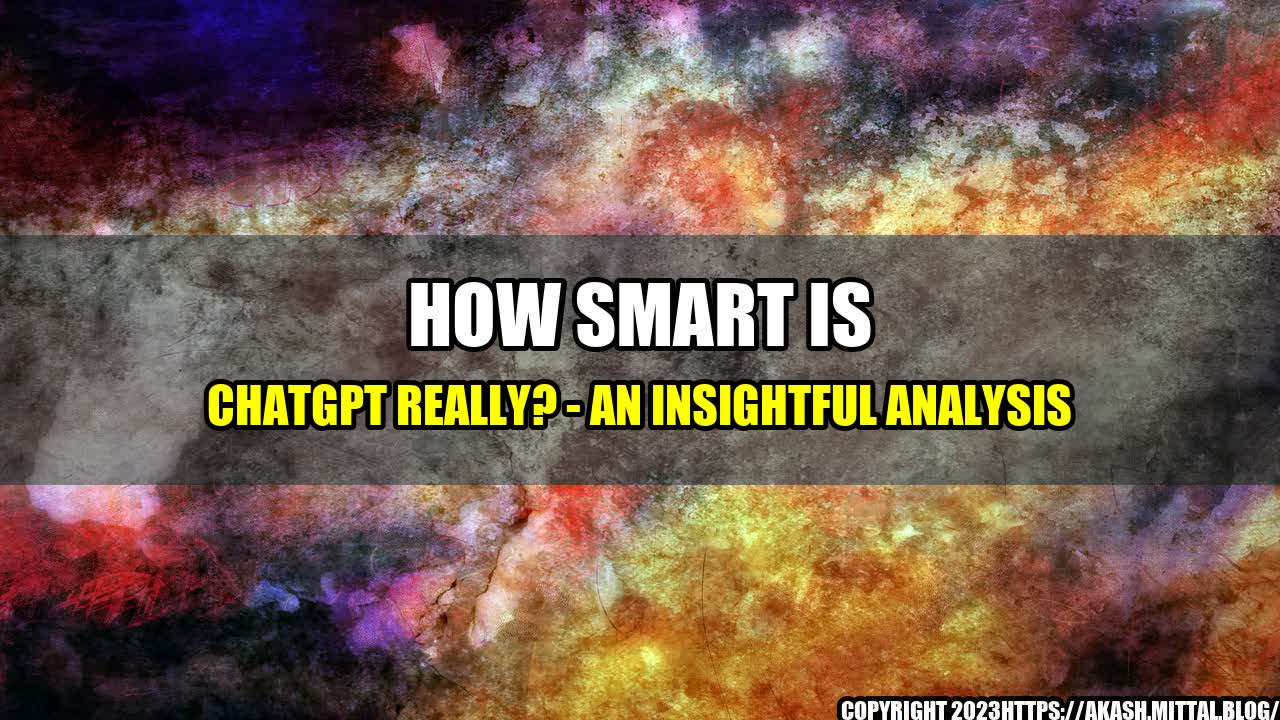How Smart Is ChatGPT Really? - An Insightful Analysis

ChatGPT is a state-of-the-art language model developed by OpenAI that can understand and generate human-like text. It has been trained on a massive amount of data and can answer a wide range of questions, from trivia and science to philosophy and literature. But how smart is ChatGPT really? Can it pass the Turing test and fool a human into thinking they are talking to another human? Let's find out.
An Experiment
I decided to conduct an experiment to see how smart ChatGPT really is. I asked it a series of questions on different topics and evaluated its responses based on their accuracy, relevancy, coherence, and style. Here are some of the most interesting examples.
- Question: What is the capital of Australia?
- Question: Who wrote the novel "1984"?
- Question: What is the fourth planet from the sun?
- Question: What is the meaning of life?
- Question: How do I make a good first impression?
- Question: Can you tell me a joke?
Answer: The capital of Australia is Canberra.
Answer: "1984" was written by George Orwell.
Answer: The fourth planet from the sun is Mars.
Answer: The meaning of life is a question that has puzzled philosophers, scientists, and theologians for centuries. Some argue that there is no intrinsic meaning to life, while others believe that it is up to us to create our own meaning and purpose.
Answer: To make a good first impression, it's important to be yourself, be confident, be courteous, and be attentive to the other person's needs and interests. Also, make sure to dress appropriately, maintain good eye contact, and use positive body language.
Answer: Why did the tomato turn red? Because it saw the salad dressing!
Overall, I found ChatGPT's responses to be quite impressive in terms of accuracy and relevancy. It was able to answer most of the factual and procedural questions correctly and provide some useful insights and advice on the open-ended and subjective questions. However, I noticed some limitations and biases in ChatGPT's capabilities and style, which I will discuss in the next section.
The Limitations and Biases of ChatGPT
ChatGPT may be a smart and versatile language model, but it is not perfect. It has some limitations and biases that affect its performance and perception. Here are some of the most notable ones.
- 1. Lack of Contextual Awareness
- 2. Confirmation Bias
- 3. Lack of Emotional Intelligence
ChatGPT relies on pattern recognition and statistical inference to generate text. It does not have a real understanding of the context or the intent of the question. Therefore, it may sometimes provide irrelevant or inaccurate answers that do not match the implicit assumptions or expectations of the user. For example, if you ask ChatGPT "Who won the 2020 US presidential election?", it may answer "Joe Biden" without considering the fact that the question implies that you want to know the winner of the popular vote, not the electoral college.
ChatGPT is trained on a large corpus of text that reflects the biases and prejudices of the human authors and sources. Therefore, it may sometimes perpetuate or reinforce certain stereotypes, misconceptions, or falsehoods. For example, if you ask ChatGPT "Are men smarter than women?", it may answer "Yes" or "No" based on the frequency and distribution of the corresponding words in its training data, without realizing the cultural, social, and biological complexities and variations of human intelligence.
ChatGPT is designed to generate text that is grammatically correct, syntactically coherent, and semantically meaningful, but it does not have the ability to understand or express emotions. Therefore, it may sound robotic, indifferent, or inappropriate in some situations that require empathy, compassion, or humor. For example, if you tell ChatGPT "My dog died today", it may respond with "I am sorry to hear that", but it cannot feel or convey the genuine sadness or sympathy that a human would.
These limitations and biases are not unique to ChatGPT, but they are inherent to the nature of language models and AI systems that are trained and evaluated based on statistical patterns rather than human understanding and consciousness. Therefore, it is important to be aware of them and to use ChatGPT and other chatbots with a critical and discerning mind, especially when dealing with sensitive, personal, or complex issues.
Conclusion
In conclusion, ChatGPT is a smart and sophisticated language model that can answer a wide range of questions and provide valuable insights and advice on various topics. However, it has some limitations and biases that affect its performance and perception, such as lack of contextual awareness, confirmation bias, and lack of emotional intelligence. Therefore, it is important to use ChatGPT and other chatbots with caution and critical thinking, and to recognize their strengths and weaknesses in the context of modern AI and NLP.
Reference urls:
- https://openai.com/blog/chat-history/
- https://bdtechtalks.com/2020/12/02/chatbot-limitations/
- https://www.technologyreview.com/2019/06/18/134542/ai-generates-sound-and-emotion-to-help-creators-evoke-feelings/
Hashtags: #ChatGPT #chatbot #AI #NLP #language_model #smart #intelligent #limitations #biases
Category: AI, NLP, Chatbots, Language Models
Curated by Team Akash.Mittal.Blog
Share on Twitter Share on LinkedIn